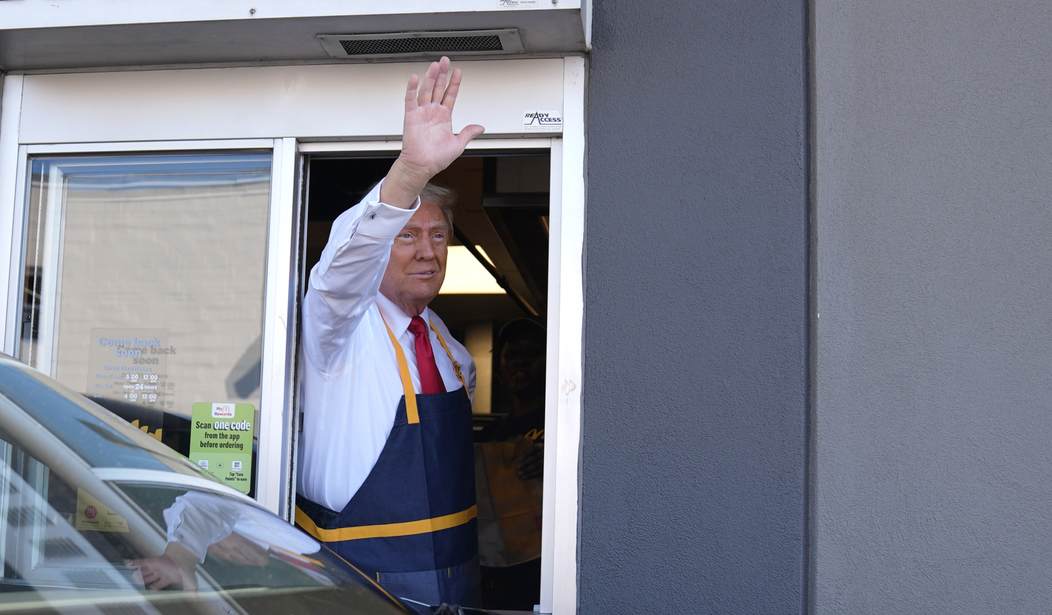Following last week's historic election results, both parties' presidential campaigns are already deeply engaged in autopsies and analysis of why they won or lost. They're seeking to forge a better path forward for their causes by identifying what worked and what didn't.
And while there is a vast wealth of data to be analyzed, numbers to be crunched, and theories to be theorized, what carried Donald Trump to victory is quite simple.
Over three decades have passed since President Bill Clinton disarmed a heckler at a campaign rally in Manhattan with four simple words.
"I feel your pain."
Trump became the first politician (he has to be considered a politician at this point, right?) since then to capture that feeling. Not only through words but by living them out with his actions.
In the final weeks of the campaign, Democrat nominee Kamala Harris was appealing to one demographic and one demographic only - people who are told what and how to think by celebrities, while also having an intelligence quotient low enough to be captivated by the phrase, "I come from a Middle-Class family."
Turns out that's actually a very small portion of the population.
Harris' campaign was shelling out millions upon millions of dollars in donor money to provide de facto concerts for people who already supported her by showing up to rallies. Five million dollars for Meghan Thee Stallion (not just any stallion) here. One point eight million for Eminem there. A shocking $10 million for Queen Bey.
To paraphrase Oprah Winfrey, whose production company also got paid $1 million to produce a sit-down live stream interview with the Democrat, 'You get a million. You get a million. Everybody gets a million!'
Beyonce = 10 MILLION
— Erich Hartmann (@erichhartmann) November 12, 2024
Lizzo = 2.3 MILLION
Meghan The Stallion = 5 MILLION
Eminem = 1.8 MILLION
Oprah = 1 MILLION
Call Her Daddy = 500k
etc, etc.
Harris / Walz funneled tens of millions of Act Blue donations from Democrat normies to BRIBE celebrities for their "endorsements" 😳 pic.twitter.com/fB8EYWNUAb
While this is where Harris and her people were focusing their time, energy, and other people's money, Trump was not just playing the everyman. He was becoming the everyman.
Trump's campaign decided the winning strategy was to focus on the common people. People like you and I. And it resonated with the pulse of the everyday American. Donald Trump's campaign was not just about securing votes; it was about touching lives.
For many like me, it was a campaign that spoke directly to our lives, our struggles, and our hopes.
Nobody alive on that day will ever forget the images of one of the richest men this nation has ever created ditching his suit jacket and throwing on an apron so he could work the fryers, take orders, and serve customers at a local McDonald's in Feasterville, Pennsylvania.
Yes, it was a petty shot at Harris, who had claimed - without evidence (the media's favorite disclaimer for Trump) - that she worked at the fast food franchise when she was younger. But it was relatable. Who amongst us didn't start their working lives at a fast food joint, a grocery store, a newspaper route, or a gas station? I bet there are a lot who did.
I know I did. I delivered newspapers at the age of 12 and then started working at Burger King out of high school. Oh, and guess what, I've got former co-workers who will vouch for me on this, unlike Kamala.
Not only was Trump's McDonald's gambit relatable, but it was funny. The absurdity of a man wealthy all of his life working the drive-thru was something to behold. The fact that he did it with energy and genuine enjoyment? Well, you just can't buy that kind of admiration or political capital from the average American.
Shortly thereafter, Trump took the level of trolling to a nuclear weapons-grade level when, after President Biden declared his supporters to be "garbage," he threw on an orange vest and hitched a ride in a garbage truck on the way to his next campaign stop in Green Bay, Wisconsin.
TRUMP ARRIVES FOR CAMPAIGN RALLY IN A GARBAGE TRUCK!
— J Stewart (@triffic_stuff_) October 30, 2024
“How do you like my garbage truck? This truck is in honor of Kamala and Joe Biden.”
“For Joe Biden to make that statement — it’s really a disgrace” pic.twitter.com/jA9nEQKvCg
Again, it is that old adage, 'I feel your pain.'
I know people working multiple jobs - in fast food or otherwise - are struggling to make ends meet. I know people on the right, center-right, or in the middle of this country have been treated like garbage.
I know it. And I feel it. That's the message Trump delivered.
From my personal standpoint, the very moment I felt like Trump was truly going to win came at his rally at Madison Square Garden. Make no mistake, I am a Trump supporter. Have been for quite some time. A reformed one, as my initial choice early on in the 2016 campaign was a different candidate. That was before I realized an earth-shattering movement was afoot for the Republican party. (Hey, cut me some slack, even J.D. Vance was slow to come around).
Speaking at the MSG rally, Trump offered a new campaign promise that I hadn't heard before. A tax credit ... for caregivers.
"I am announcing a new policy today that I will support a tax credit for family caregivers who take care of a parent or a loved one," he declared. "It's about time that they were recognized."
🚨 NEW POLICY ALERT 🚨
— Trump War Room (@TrumpWarRoom) October 27, 2024
"I am announcing a new policy today that I will support a tax credit for family caregivers who take care of a parent or a loved one. It's about time that they were recognized." pic.twitter.com/DBX2L7jDVT
Listen, I've been around a while. That marked the first time in my adult life that it felt like a political candidate had reached through a television screen to address my family personally.
My wife was diagnosed with leukemia (the lifelong version of the disease) in 2019. Three years later, my son was diagnosed with epilepsy. Our visits to the local hospital and/or cancer institutes across the Northeast are frequent enough that I have joked about buying stock in them.
I don't want to delve too far into a "woe is me" moment, as my wife and son are doing quite well. And we are grateful to have good insurance. But as their caregiver, keeping track of medications and appointments while working two jobs to stay ahead of the medical bills can sometimes way heavily.
There is a saying in the community that "Nobody ever asks how the caregiver is doing." And that is because, rightly so, the person they are caring for is suffering far worse. Their battle is far more difficult. They should get the attention.
But that doesn't mean we don't want someone to reach out once in a while and say, "Hey, here's a little reward for your efforts."
Trump did that for me. And while I had been cautiously optimistic with friends and family that the former president would win, even suggesting a landslide, it was at that moment I knew it was a lock. If something like this was making me and my family feel seen, that somebody out there actually cares about what we’re going through, then it seemed clear we were not an exception.
Trump was making others feel the same way too.
It turned out to be true. The election was indeed a lock. Not so much because of grand promises of change, but because of personal touches that resonated with the heart of every American.
Trump had run a nearly flawless campaign, not by playing the traditional political games, but by speaking directly to the everyday American, making them feel like they mattered in the grand scheme of things.
In other words, he felt our pain.















